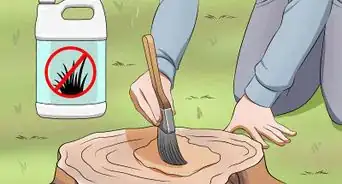wikiHow is a “wiki,” similar to Wikipedia, which means that many of our articles are co-written by multiple authors. To create this article, 13 people, some anonymous, worked to edit and improve it over time.
There are 7 references cited in this article, which can be found at the bottom of the page.
wikiHow marks an article as reader-approved once it receives enough positive feedback. In this case, 86% of readers who voted found the article helpful, earning it our reader-approved status.
This article has been viewed 69,598 times.
Learn more...
If you live in the same area as elephants that are roaming freely (namely, parts of Africa and Asia), you're at risk of damage to your property, livelihood, and even potential injury from marauding elephants who can consume up to 450kg of food a day. Protecting your property in ways that discourage elephants can be done with a little know-how.
Steps
-
1Plant chilli peppers with your food garden and field crops. Elephants cannot stand chilli peppers and if they're liable to get a mouthful of chillis with the crop, they're more likely to avoid it. Other ways to use chilies to deter elephants include:
- Mix chilli pepper with old engine oil. Paint twine or string with this mixture and hang the twine around your field or garden.
- Collect elephant dung. Pile chilli pepper onto the dung and burn it. The pungent smoke will release chilli pepper residue into the air. You should keep away too! These can also be made into "chilli-dung" bricks or balls if you know how to fashion them this way.
- Tobacco might also work when ground up and mixed with engine oil and ground chilli. Smear this concoction on ropes surrounding the food garden or crops. Tobacco dust from tobacco factories can also be used, even without chilli.[1]
-
2Use strong flashlights, spotlights, or floodlights at night to deter night raids. Elephants are partial to feasting by night so if you can rig up something that will suddenly flash very bright lights at the moment the elephants turn up, this might be sufficient to scare them off.
- The lights need to be very bright and there must be enough of them to appear intimidating.
- This method can also scare off hippos. But beware the potential for them to charge in response!
Advertisement -
3Put in electric fencing. This has been proven to be a long-term deterrence against elephants, albeit a costly one.[2] Some ways to reduce the cost of having such a fence include:
- A single live strand of electric fencing located 1.5 meters (4.9 ft) above the ground can be sufficient to deter elephants, while allowing other animals to come and go untouched.
- Use bush poles instead of metal stanchions to reduce the costs.
- Use solar panels to create the electricity. However, you will probably need to guard the solar panels or find some way of preventing their theft.
-
4Plant crops that elephants don't like. If you're growing crops to sell, consider changing to crops that elephants can't be bothered to raid because they don't like them. Crops of good value that elephants don't like include ginger, cocoa, sisal, tea, oil seed, and chilli.
-
5Change the timing of your planting or harvesting. Occasionally, changing the timing is enough to deter elephants.[3]
- Find out about crops that germinate at different times of year.
-
6Keep crops clustered together. Crops that form islands dotted here and there have proven to be more vulnerable to elephant raids than crops clustered closely together.[4] Try to plant your crops or food gardens in large communal fields. Band with your neighbors to grow large, square or rectangular fields with fences or hedges grown using thorny and spiny plants.
-
7Create noise. Sometimes, shotgun firing over the top of a raiding herd of elephants can deter them. The problem with this is that you will need to call in a team authorised to do this, so planning is required, and probable costs will be incurred. Ask your local authorities for more information. Other methods of making noise to scare off elephants include:
- Shouting, yelling, whistling as a group.
- Banging on things such as drums, tins and trees.
- Setting up an alarm can do two things - one, it alerts you to the presence of elephants and two, it can scare off the elephants if the alarm noise is loud enough.[5]
-
8Add some beehives on the perimeters of your crops or food garden. Elephants are afraid of bees. Strategic placement of the beehives could help keep the elephants at bay - research is still being carried out on the effectiveness of this solution.[6]
- You can also harvest the honey as an ongoing concern if wished.
-
9Elephants have a tendency to sniff the bark of trees for any urine markings and have territorial consciousness. Normally, they may not reciprocate if they counter other herds of elephants. Collecting elephants urine from the nearby zoo or conservatory and spraying around the trees on the border of your area may give an adverse signal for the elephants to proceed.
Community Q&A
-
QuestionWhat happens if the elephants develop an appetite for chili peppers?
 Community AnswerThis is unlikely since the chemical in chili peppers is designed to cause discomfort in mammals. Birds, however, are not affected by it and would be more of a concern.
Community AnswerThis is unlikely since the chemical in chili peppers is designed to cause discomfort in mammals. Birds, however, are not affected by it and would be more of a concern. -
QuestionHow can I protect my family from elephants?
 Community AnswerPut beehives and plant chili or other plants that elephants hate. Put up electric fences.
Community AnswerPut beehives and plant chili or other plants that elephants hate. Put up electric fences. -
QuestionI tried every idea, but they all failed and elephants destroyed all my crops. I am helpless. What can I do?
 Community AnswerPlant chili seed, cocoa, tea, oil and sisal. Elephants hate the taste of those crops. Put beehives around the farm, since elephants are annoyed and frightened by bees.
Community AnswerPlant chili seed, cocoa, tea, oil and sisal. Elephants hate the taste of those crops. Put beehives around the farm, since elephants are annoyed and frightened by bees.
Warnings
- Throwing things at wild animals is never recommended. Hurt and angered animals react the same way you would – in self defense against the cause of their pain.⧼thumbs_response⧽
- Be careful of charging or angry reactions from elephants when using any deterrence method.⧼thumbs_response⧽
Things You'll Need
- Chilli pepper
- String
- Bright lights
- Elephant dung, matches or lighter to set on fire
- Beehive
- Noise making items
References
- ↑ FAO, Human-Wildlife Conflict in Africa, p.56, http://www.fao.org/docrep/012/i1048e/i1048e00.htm
- ↑ FAO, Human-Wildlife Conflict in Africa, p.52, http://www.fao.org/docrep/012/i1048e/i1048e00.htm
- ↑ FAO, Human-Wildlife Conflict in Africa, p.53, http://www.fao.org/docrep/012/i1048e/i1048e00.htm
- ↑ FAO, Human-Wildlife Conflict in Africa, p.53, http://www.fao.org/docrep/012/i1048e/i1048e00.htm
- ↑ FAO, Human-Wildlife Conflict in Africa, p.55, http://www.fao.org/docrep/012/i1048e/i1048e00.htm
- ↑ Jake Richardson, Bees could save elephants and protect crops, http://www.care2.com/greenliving/bees-could-save-elephants-and-protect-crops.html#
- ↑ FAO, Human-Wildlife Conflict in Africa, p.55, http://www.fao.org/docrep/012/i1048e/i1048e00.htm
- ↑ FAO Media Centre, http://www.fao.org/news/story/en/item/44027/icode/
- The FAO document Human-Wildlife Conflict in Africa is downloadable in PDF format from here: http://www.fao.org/docrep/012/i1048e/i1048e00.htm – research source


































































